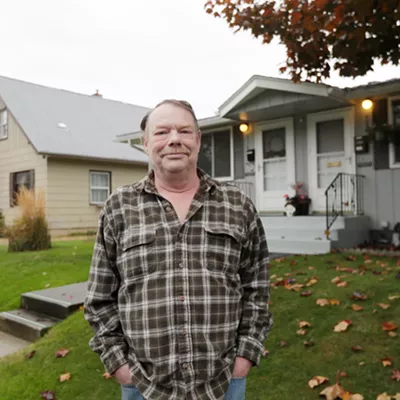These days, it's common for public officials to hear both tenants and landlords expressing feeling a kind of helplessness: In the past two years, Washington state has passed a number of new tenants-rights protections, requiring landlords to jump through more hoops and exhaust more options before evicting problematic tenants.
But tenants push back by pointing out that landlords often own their only source of shelter — an incredible kind of power — and with so few apartments available, it can feel impossible to find a new place. Meanwhile, rent is skyrocketing.
"There's a lot of frustration and fear out there right now," says City Council member Karen Stratton.
It's not just a matter of dealing with rent, either. Home improvement is a lot tougher when it's either not your home or you're a landlord not living in the home. On the other hand, what happens when a tenant starts regularly causing damage to your property? Or what happens when your water heater — or even sink — breaks and your landlord hasn't fixed it?
"I've heard stories of tenants not having running water," says local Tenants Union Director Terri Anderson. "Or the plumbing is so bad, they need to keep buckets of water to fill the toilet."
SO YOU HAVE A BAD LANDLORD
Document everything. Start with the obvious. Before you move in, take pictures of all the existing damage or things that look like damage. Otherwise, that smudge could be used to dock your damage deposit. But that also applies to documenting your attempts to request repairs.Michelle Lucas, managing attorney for the eviction prevention unit, recommends corresponding over email. "If your landlord will only talk to you on the phone, you can always memorialize those conversations in an email," Lucas says. Summarize your conversation accurately and send them an email. That can be a crucial legal protection — and can encourage your landlord to start paying attention.
Flag problems early. Lose hot water, heat or electricity? Your landlord is legally obligated to start the process of fixing that within 24 hours. Have a broken fridge, sink, oven or toilet? The landlord has to start the repairs within three days. All other major repair requirements have a 10-day window. But, crucially, that timer only starts when the landlord is alerted to the problem. TenantsUnion.org offers easy form letters that you can send that helpfully outline the issues. Make sure the landlord has received it, either by confirming over text or email or — if it comes to that — by presenting it to him personally.
Keep paying rent. It may seem like refusal to pay rent — effectively a rent strike — could force a landlord refusing to make repairs to get on the ball. In fact, that usually just hurts yourself, tenant advocates say, putting you at risk of eviction. It might be possible to pay for minor repairs yourself and get the payments deducted from your rent later, but it's usually something you want to get clearance up front before committing to.
"It's completely acceptable to call your council member. Part of their job is to help their constituents through crises."
Call for help. Landlord-tenant laws are too complicated to summarize here. Fortunately, the Tenants Union has a tenants-rights hotline you can call. Anderson says the City of Spokane and the City of Airway Heights have great code enforcement departments that have helped tenants before.
"It's completely acceptable to call your council member," Stratton says. Part of their job is to help their constituents through crises. And Stratton says there's one surprising agency that's helped deal with bad landlords in the past: the local landlord association. They generally know who the problem landlords are, Stratton says, and have been willing to apply a little bit of encouragement so the bad apples don't give the rest of the landlords a bad name.
SO YOU HAVE A BAD TENANT
Document everything. Gone are the days when you can just boot out a month-to-month tenant by simply ending their lease. And considering that low-income tenants now have a right to counsel in Washington state, if you don't provide a lot of detail, it's quite possible you might not just lose an eviction proceeding but could be charged attorney fees, too."We've gone from doing one-page notices to 30-, 40-, 50-page notices," says Rob Trickler, an Olympia-based landlord attorney and president of the Washington Landlord Association.
Forge loyal relationships with maintenance guys. Ever since the 2008 housing crash, there's been a shortage of maintenance and construction workers.
"Good luck getting a plumber out," Trickler says. "I had clients that had pipes freeze. They spent days trying to locate a plumber with no success."
But if you already have a good relationship with the plumber, he's more likely to bump you to the front of the line in an emergency.
Check in frequently. "Stay on top of it," Trickler says. He says statute recommends inspecting rental units four times a year, but there may be good reasons to inspect even more often. That's the best way to detect the sort of issue — like a bunch more people living in a unit than are on the lease — that can cause much more wear and tear to a unit.
"Require that tenants report any damage, and act on it if they don't," Trickler says.
One of the best ways to get cooperation from your tenants — both the good and bad ones — is to let them know what's happening. Is it taking a long time to find an available contractor to fix something? If a tenant doesn't hear from you about a repair, they may assume you're just ignoring them. ♦






























